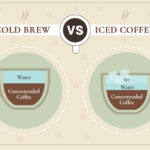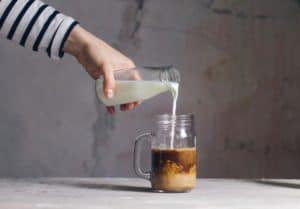
We all love that first sip. Whether you are rolling out of bed or getting pumped up to tackle another task, coffee is instrumental to the productivity of millions of people who can not imagine a morning without caffeine. But for some, there is often an unfortunate drawback. The enjoyment of their favorite morning beverage can end abruptly when they realize they are suffering the discomfort of heartburn. Unfortunately, coffee can cause heartburn because of its acidity.
What is Heartburn?
Heartburn is a misnomer since it is not the heart that is affected, but rather the esophagus. The reason for the burning sensation is the reflux of acid that comes through the lower esophageal sphincter (LES) from the stomach into the esophagus itself, and often reaches the throat and even the mouth. In some cases, people can also experience nausea, stomach pain, and a sour taste in the mouth. The LES normally opens when food passes through into the stomach. However, if it does not close completely, acid can find its way back up the esophagus, which causes what we know as heartburn.

Most people experience the occasional heartburn, and it is most often triggered by certain foods. For some, heartburn can occur more often, resulting in acid reflux. When acid reflux occurs regularly, more than twice a week, it can be grounds for a diagnosis of GERD (Gastroesophageal reflux disease). Acid reflux can often be managed by lifestyle changes whereas GERD may take factors such as age, genetics, and anatomy into account. Both are manageable, but GERD is more severe and can cause more serious health issues.
Diet plays the biggest role in the frequency of heartburn. Highly acidic foods are far more likely to trigger a negative response from your stomach than those that are not acidic. Here’s a list of some of the biggest potential culprits:
- Citrus fruits
- Onions
- Garlic
- Spicy foods
- Alcohol
- Chocolate
- Coffee
- Tea
Even though acidic foods are more likely to cause heartburn, there are also other factors. Coffee, even though it is notably acidic, does not contain calories when consumed black. It may not be a factor in indigestion, and there haven’t been enough medical studies to prove whether coffee actually causes heartburn.
Why Can Coffee Give Me Heartburn?
It is often stated, perhaps oversimplified, that coffee may cause heartburn because of the acidity. Certainly, acidity plays a factor. It can also depend upon the quality of the coffee beans and the type of roast. However, there is another factor at work: the caffeine content of coffee. This also applies to tea. Acidity can account for some level of reflux but over-caffeination can cause the LES to relax and not close completely, causing gastroesophageal reflux. One of the reasons that coffee may be giving you heartburn is that you are drinking too much.
How Do I Stop Coffee Heartburn?
Limit Your Caffeine Intake
If you are having major issues with heartburn while drinking coffee but don’t want to call it quits on one of your favorite beverages, consider limiting your intake to 1 – 2 cups per day. For many, this won’t happen overnight. If you are accustomed to drinking a pot per day, cut back 50% every two days. This will help you avoid migraines while you are weaning off to a healthier amount. Also, going cold turkey not only has a lower success rate, but it can also set you up for disappointment if you don’t meet your goal. Then you end up back at square one.
Drink Shade-Grown Beans
A lot of coffee on the cheaper end that you will find in the supermarket is sun-grown. Increased supply and demand have commercialized the growth and distribution of coffee so that much of it is grown in less than favorable conditions. Most coffee plants are not meant to be exposed to the heat of the day for long periods, but the beans grow faster. So, there is a greater overall yield. Unfortunately, this means that the plant is often robbed of certain nutrients. The beans tend to be more acidic. Drinking shade-grown beans ensures that you will have a smoother cup.

Only Drink 100% Arabica
Strictly speaking, there are two categories of coffee beans, Robusta and Arabica. They both have their own general flavor profiles. Arabica tends to be of a lighter and sweeter taste. Robusta tends to have a more earthy and bitter flavor. Robusta is often preferred because it has about twice the amount of caffeine as Arabica beans. The beans are also harder and more resistant to disease, making them lower maintenance to grow. But the fact that Robusta has a significantly higher caffeine content than Arabica beans means that it is easier to get over-caffeinated, thereby relaxing the LES and causing reflux. Drinking Arabica beans can make it easier to control caffeine intake.
Coconut Water
If acid is a problem, try something that will balance your pH levels. Coconut water is alkaline and also contains electrolytes including potassium, magnesium, and calcium. You can drink it straight as a chaser after your cup of coffee. It’s also become popular as a milk substitute in coffee because it’s more hydrating than half and half and other milk substitutes. Milk is touted as a neutralizer since the pH level is about 6.8. But it also is known as an acid-forming food. While milk or cream in coffee is as popular as ever, many are seeing complications in their health either from allergies or from overconsumption. Check out this Coconut Water Cold Brew as an example of a tasty way you can implement this into your coffee ritual.
Coffee & Your Diet: Final Thoughts
If you can’t resist that morning joe (like most of us) and you want to avoid the heartburn, just remember to limit the amount of caffeine you consume per day, drink 100% Arabica beans, and consider the rest of your diet. Your coffee drinking is a part of your diet, not a completely separate category. If you’re overconsuming spicy foods, dairy, and alcohol, but you need that cup of coffee, consider what you could nix from your diet for the better enjoyment of your daily brew.
Featured Image Credit: Pixabay















